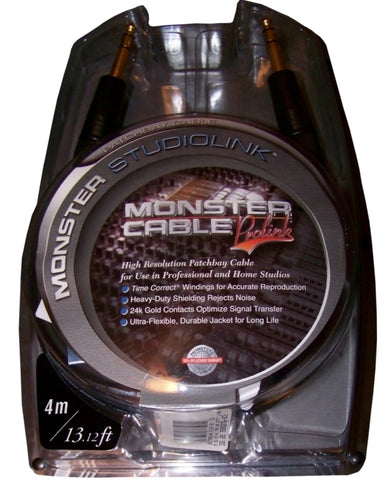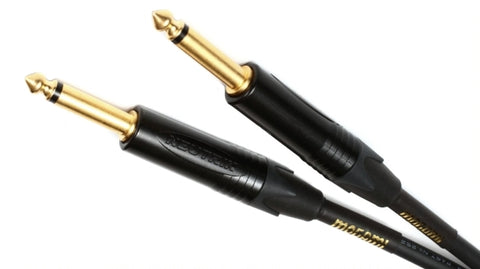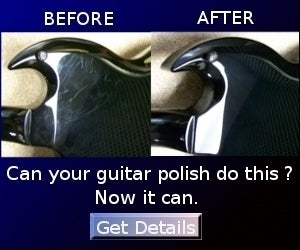Today we'll look into whether premium guitar cables are worth the hype, and offer four easy tips for your next guitar cable purchase. Unless you're new to playing guitar, you know there are many choices for guitar cords, also called 1/4 inch instrument cables. There’s everything from free cables packed with cheaper guitars or guitar/amp starter kits to entry level music store cables. There's lifetime built cables, and there's premium pricey cables like Monster and Mogami.

So is there a difference?
In a word, yes! How much so really depends on your playing level, gear, and the ever-subjective "tone" debate. For these reasons it is impossible to give a 100% conclusive answer for all situations, so we will rely on some test comparisons and common sense, as well as our What to Look For tips below that everyone can benefit from.
Our gear expert is a former guitar chain store manager we will call ‘Ryan’, who compared Mogami, Monster, and a good quality standard music store cable. Here's his findings:
“I tested the Mogami Gold vs the Monster Rock. Both were better sounding than the Roadhog (a music store 'house' cable for $14.99). The Monster Rock had boosted highs and lows while the Mogami was more flat in EQ. The same amp and guitar settings were used for each. Both Monster and Mogami Gold cables were cleaner and more defined sounding than the stock guitar cord. I ultimately went with the Mogami although I would have been happy with either. Ultimately you adjust the EQ on your amp."

"I went with Mogami for it's lighter cables with less handling noise compared to the heavy Monsters. Didn't mean to use the word ultimately twice in the same paragraph. That's way too ultimate. Lol”
(I asked for clarification from him about handling noise...)
“Yeah the diameter of the cable is smaller, it's lighter in weight, and if you are plugged in and you slap the cable on the floor it makes less noise out...”
CONCLUSION – Both Mogami and Monster were a noticeable improvement over standard guitar cables. Not only are they built to last, but these premium cables sound better.
Guitar Cables - A Common Sense Approach
Considering how much you paid for your guitar, amp, and pedals, a good cable is only a fraction of the cost of any of these items. For that reason I believe in getting at least one high-end cable. These cables usually have a lifetime warranty so this is probably a one-time investment.
I have seen many guitar players using CHEAP FREE CABLES that came with their guitar. These are the light-duty short black cables that usually only last 1-2 months before they short out. They are noticeably thinner and flimsier than most cables. Run them over a chair a few times and they're toast! These are really only good for beginners or as a very temporary spare cable. Everyone else should get something better, any upgrade here is a good idea even if you don't want to go all-in on a $40 cable.
Analog vs Digital Signals
For those that still aren't convinced, keep in mind your guitar signal is basically an analog signal. That means it theoretically can degrade over a long cable run or if your cable has poor build or shielding. Compare that to a digital signal, like those sent over HDMI cables for television and DVD players. Digital means there is no signal loss whatsoever (in fact if there is digital signal loss you'll get errors and your device won't work right!). Remember the old analog cellphones? When the signal goes bad its harder to hear the other person with static and noise. With digital, it just drops parts of the call until it eventually disconnects. Here's another easy way to think of digital vs analog: two kids talking over Walkie-Talkie or paper cups and string use an analog signal. The voice quality degrades through the “air” or line, and relies on the listening device to reproduce that signal as best as possible. There is always quality loss in these two examples. That's why often the farther away you get the poorer the sound quality. In the digital realm you are only transmitting numbers, which are encoded and then decoded by the source and receiver; there is no signal loss. Kind of like sending a text message. So the length of the cable doesn’t matter in the digital world, but since a guitar signal is analog, the theory is signal loss can happen with cheap or very long cables.
Good guitar cables have better shielding to prevent signal loss, especially important in long cable runs. This ensures the copper core transmits the best possible outcome, and is less prone to picking up interference. We believe this is why premium cables are better. Even more important if you run through alot of effects. Better materials ensure better shielding and delivery of you guitar signal, which is analog (and remember: by definition analog signals can degrade although it is usually very minimal). So technically the signal is better preserved even if there is no huge noticeable tone difference. It's the theoretical benefit of quality here we think matters. In the digital realm, this just doesn't matter. That's why cheap HDMI cables (as long as they aren't damaged) deliver EXACTLY the same quality as a $50 'premium' cable at your big box TV store. No matter what the salesman says. There is no sound difference because they are just transmitting encoded numbers; it a digital signal. YES, REALLY! (Since HDMI cables are rarely touched once installed, I've enjoyed years of trouble free HD telecasts from cheaper HDMI cables. Again, digital is different and you can get away with the cheap ones.)
What to Look For - 4 TIPS
If you get premium cord like Mogami or Monster, you're basically covered because you get the best shielding, copper core, and warranty. But here's what to do if you don't want to break the bank on a $50 cable, or you need a bunch of cables for your band and are trying to save some cash:
1. Get a Lifetime Cable, meaning something with a lifetime replacement guarantee. This is the number one thing you can do. Every guitarist can afford this because lifetime cables usually start around $12-15. Lifetime replacements means the cable is likely built to higher standards. (This also means it will hold up better to bending, and occasionally getting it caught under your chair.) In fact, in over 20 years I've never wore out a lifetime cable so I know they're built better. Many big box stores offer walk-in replacement on either their brand of lifetime cable or they even honor some of the premium brands replacement. This is really nice, because ya don't have to ship it off somewhere.
2. Get the 'longest short' cable you need. If you aren't playing live at Hollywood Bowl yet, you may not need a super long guitar cable. You may be fine with 10-12 ft. shorter cords and these are easier to pack away, less wear by wrapping and coiling them and less signal loss over long runs (again usually minimal). Or get one quality 25 ft cord and the rest shorter.
3. Consider one end having a right angle. Until you've tried this you don't know what you're missing. Some amps and effects just accommodate a right angle plug better, and even some guitars like elbow or right angle plug best, especially acoustic guitars. You'll also put less stress on the cable end in most right angle situations. Most of these cables have the right angle on just one end so if the other end of your gear needs a straight plus, you're golden. Speaking of golden, see next point.
4. Look for beefy connectors. You can tell a good cable when it has strong sturdy connections that touch the metal jack casing. This protects the cable from bending too much and cracking where it enters the metal jack. This is the area where most guitar cables eventually fail! ...just like headphones. Ugh! Don't worry about gold plated plugs and tips, this is more about looks and higher price than sonic performance.
Hope this takes the kinks out of the cable hype. At least these kinds of guitar cords require no practice. See you next time! Jason

